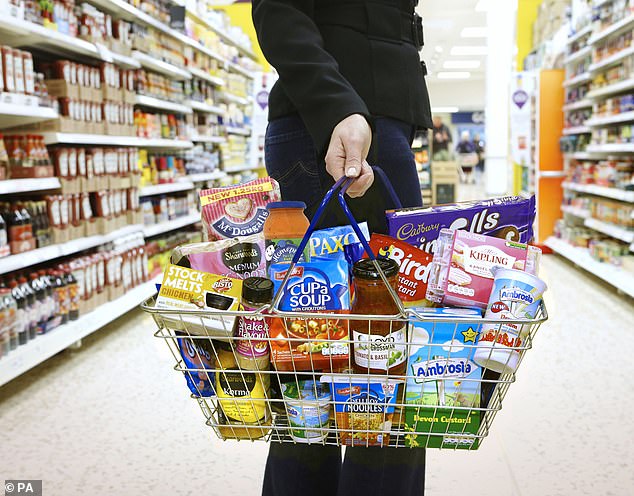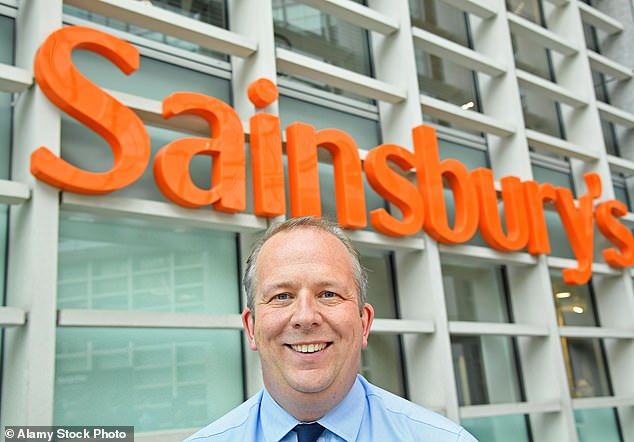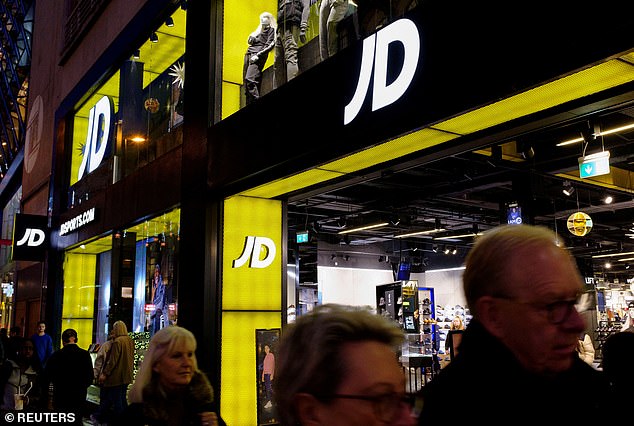Last week saw an outbreak of optimism as some British retailers reported bumper Christmas sales figures.
Sainsbury’s boss Simon Roberts hailed the supermarket’s ‘biggest ever’ New Year, as it joined competitors Tesco and Marks & Spencer in hiking its profit expectations.
Meanwhile, High Street retailers Next and JD Sports also reported a plush end to 2021, confounding initial predictions of a tough year.

Undervalued? The share prices of two of the FTSE’s big supermarkets — Tesco and M&S — remain lower than they were ten years ago
Though the sales boost will have delighted store bosses, reaction from the markets has been mixed.
While Sainsbury’s gained 3.4 per cent last week, other retailers slid back, with Tesco and Next down 2.55 per cent and 2.95 per cent in the same period. In the longer term, the share prices of many retailers are stubbornly depressed.
Indeed, the share prices of two of the FTSE’s big supermarkets — Tesco and M&S — remain lower than they were ten years ago.
But could the Christmas spending spree signal a change in fortunes?
‘While recent trading updates have been impressive, investors are focused on a tougher 2022,’ says Garry White, an analyst for the investment platform Charles Stanley.
He cites several potential clouds on the horizon, including the ongoing supply-chain crunch — which is raising the price of many essential items — and the much-feared hike in energy prices.

Boost: Sainsbury’s boss Simon Roberts hailed the supermarket’s ‘biggest ever’ New Year, as it joined competitors Tesco and Marks & Spencer in hiking its profit expectations
With energy bosses warning high prices could last two years, markets fear that customers will be left with less cash to splash.
Like many sectors based on discretionary spending, retail suffered badly in the Covid crash of February and March 2020.
While some retailers — such as Pets at Home — experienced a pandemic boom, the sector struggled throughout lockdown.
But against a backdrop of low expectations, there have been some recent success stories. ‘After many years of disappointing performance, Marks & Spencer shares jumped by 74 per cent in 2021,’ says Mr White.
‘The company has made vast progress online, with about half of clothing sales now made on the internet, and its food business has outperformed the wider market.’
Other success stories have included Kingfisher (owner of B&Q and Screwfix) and value retailer B&M — up by 53.33 per cent and 36.50 per cent in two years.
Stock-pickers insist there are other potential winners to be found within retail.
Last year’s £7 billion private take-over of Morrisons has raised hopes, for example, that UK retailers may be undervalued by the big investors that dominate the UK stock market.

High-Street retailers Next and JD Sports also reported a plush end to 2021, confounding initial predictions of a tough year
Andrew Porteous, a retail analyst with HSBC, highlights one particular supermarket as having room to grow.
A Tesco that is on form is a powerful beast and we think the attractiveness of its investment case remains under-appreciated,’ he says.
He cites early data suggesting Tesco enjoyed an even better Christmas than its supermarket peers.
However, unlike its competitors, Tesco shares remain below their pre-pandemic level — they’re currently trading at 10.38 per cent below their February 2020 price.
Mr Porteous predicts Tesco’s shares could rise around 14 per cent this year to 330p a share.
But investors nervous about picking individual stocks can look to actively-managed funds which invest in a variety of stocks.
Schroder’s Recovery Fund backs both Sainsbury’s and Marks & Spencer, alongside a range of other FTSE stocks that it believes are undervalued. Over the past five years, the fund has turned a £10,000 investment into £12,800.
An option for more adventurous investors wanting to bet on a High Street recovery would be to invest in a retail-focused REIT — or real estate investment trust.
Rather than having shares in companies, these investment trusts buy up commercial real estate and split the proceeds among their investors.
Shaftesbury is a large investment trust focused on London’s West End. While its long-term performance is hammered by a 45 per cent fall in lockdown, the trust performed steadily last year, rising by 8 per cent.
Given the current climate, it remains risky — but may appeal to bargain-hunters seeking to diversify their portfolio.
Some links in this article may be affiliate links. If you click on them we may earn a small commission. That helps us fund This Is Money, and keep it free to use. We do not write articles to promote products. We do not allow any commercial relationship to affect our editorial independence.